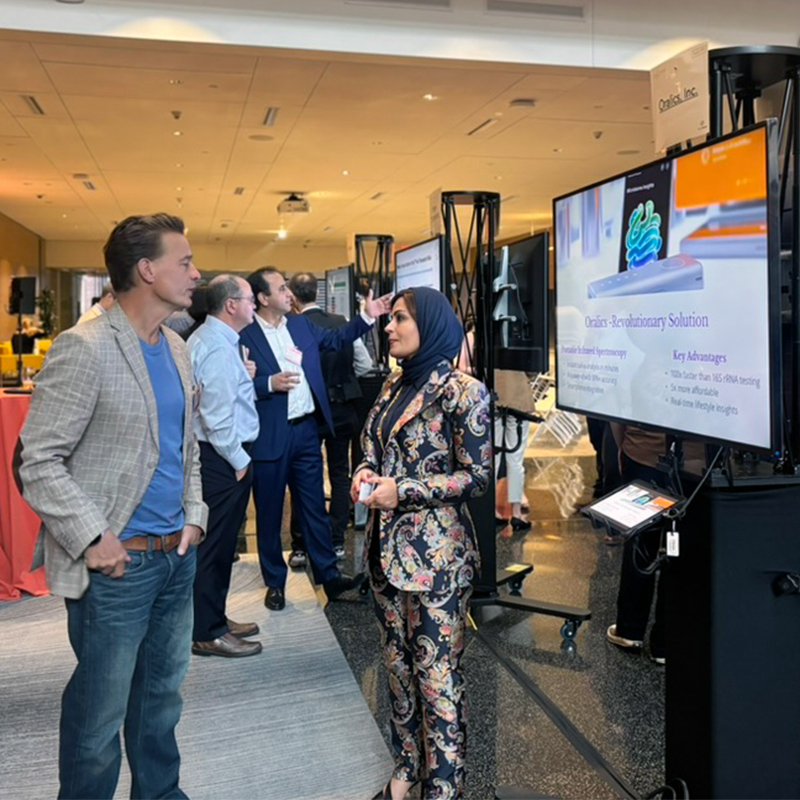
Martina Nacach Cowan Ros After one-minute pitches by startups at the Brilliant Collisions tech showcase Tuesday in Cambridge, teams stood next to presentation slides to discuss projects with attendees.
Thirteen artificial-intelligence-focused life science startups graduated Tuesday from a 12-week Cambridge program that gave them access to lab space, business training and tech support.
These companies are part of the first cohort to go through the AI Bio Accelerator Program, part of the new AI BioHub, a space in Kendall Square dedicated to the integration of biotech and AI resources. This program started when the Massachusetts Technology Collaborative, the state’s economic development agency for technology, awarded a Sector Spark grant of $1.9 million to the Cambridge nonprofit incubator LabCentral and AI venture studio C10 Labs.
The aim of the program is to create a space to support early-stage startups at the crossroads of AI and biotechnology and help them grow. The companies involved focus on a range of areas, from developing gene-editing tools to AI-powered diagnostics for Lyme disease and breast cancer.
The Brilliant Collisions showcase, which took place in the lobby of the Takeda offices in Cambridge, featured a panel of industry leaders who helped build the program, followed by one-minute pitches in which each startup presented its ideas and goals. Afterward, each team stood next to presentation slides to discuss their projects with attendees.
Kirk Taylor, chief executive of the Massachusetts Life Sciences Center, a state-funded group that supports the economic development of the sector, said Massachusetts stands out in a key area, one that provided the name of the showcase: “brilliant collisions.”
“One plus one will equal three,” he said, “meaning that by colliding with people outside of your sector but who are interested in the same areas – AI, growth, health, health equity – we’re able to create new ideas, grow even faster and actually innovate.”
Crucial after cuts
AI is important for the growth of the biotech sector, especially after a recent slowdown in research and development, Taylor said. This makes it crucial for individuals across disciplines to partner and look for alternative ways to grow, he said.
“AI accelerates just about everything,” he said. “It brings products faster to market, clinical trials [are] faster, costs lower, targets are identified in a much faster way, a much cheaper way, and with that we’re able to innovate at a much faster speed, without increasing the dollars.”
Massachusetts is the country’s top life sciences hub, Taylor said. To continue to grow, the sector needs to incorporate AI to create opportunities that will have a global impact, he said.
“The patients don’t just live in Massachusetts. They live in this country, they live in North America, they live in Europe, all around Africa, Asia, all around the world,” he said. “What we do here has global impact, because everyone deserves good health.”
Startup for startups
MassTech and the administration of governor Maura Healey announced LabCentral as a recipient of the grant in March. Four months later the program began in full operation within LabCentral’s wet lab spaces, while C10 Labs provided insight on how to bring AI-specialized support to the life science cohort, made up initially of 15 companies.
Lyndsey Rissin, director of science strategy at LabCentral, said the grant helped with capital infrastructure and programming support, which allowed LabCentral to immediately start building the lab they named the AI BioHub. By May and June, they were already recruiting teams for the cohort.
Beth Porter, head of studio operations at C10, said the cohort learned AI tools, methodologies and strategy throughout the program and were encouraged to find ways to implement these into their company business models.
Applications for the program’s second cohort are set to open early next year, offering another round of companies the chance to join.
Guardrails for AI
Chelsea Trengrove, chief executive and cofounder of AI gene-editing company Neoclease, which was one of the companies graduating from the cohort, said what once needed a full doctoral thesis can now be done in a minute with AI.
“The program has been so fantastic,” she said. “AI in every industry is just going to be enabling and accelerating. So it’s really great to have folks like this connecting us to those tools.”
She said it’s always good to be skeptical of what AI produces, and explained that there are guardrails and validation steps in place to ensure accuracy in all their work. The company is raising seed funding for a Parkinson’s editor.
“You’re trying to create something that’s going to be life-changing for a patient,” she said. “What we’re really focused on is building cures. And so, for us, it’s a really great use case of AI.”
This story is part of a partnership between Cambridge Day and the Boston University Department of Journalism.